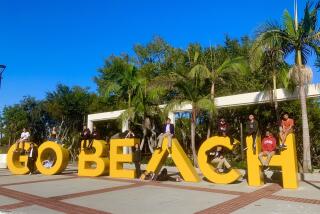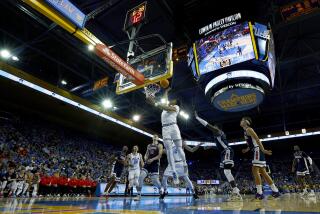UC, Cal State move on fee rise
Despite angry protests from students that led to 16 arrests at UCLA, California’s two public universities took actions Wednesday to charge higher fees for education in the fall.
The trustees of the Cal State University system voted to raise annual undergraduate student fees 10%, or $276. A key committee of the University of California regents approved a 7.4%, or $490, raise per year for undergraduates that is expected to be endorsed by the full Board of Regents today.
The actions would bring average statewide undergraduate costs to nearly $3,800 at Cal State and to more than $8,000 at UC, not including housing, books and other expenses, which can total $12,000 to $16,000. Graduate students will face even higher increases.
“This is one of the most painful things we do. None of us wants to raise fees,” UC President Robert C. Dynes said at the regents meeting at UCLA. “We’re between a rock and a hard place. The state doesn’t support us the way they should support us.”
University leaders said the fee hikes were necessary, even though a revised state budget proposal released by Gov. Arnold Schwarzenegger on Wednesday restored about $196 million to the two systems. Officials said the state budget gap was causing enormous funding shortfalls at the 23 Cal State campuses, which enroll about 450,000 students, and the 10 UC campuses, with about 220,000 students.
Officials said that at least a third of the fee increases would be devoted to extra financial aid for needy students and that Cal State fees remained well below the average of comparable schools in other states. (UC is about average among other research universities.)
But that did not assuage students, who said the hikes would cause a few to drop out and many to take on larger loans and work more hours at low-wage jobs. They noted that fees had nearly doubled in the last six years.
About 60 students, many carrying placards that proclaimed “Education Is a Right” and “Fees = Taxes on Students,” rallied against the fee hikes outside the regents meeting in the morning. Among them was Melvin Rico, a first-year UCLA biochemistry major from Ojai who wants to become a doctor. He said he helped pay for his education by working about 25 hours a week as a cook and a caretaker for the elderly.
“I’m trying my best just to afford this education and achieve my dreams. And this would make it harder,” he said of the fee hike.
Later, the regents finance committee approved the fee increase on a 7-2 vote. Lt. Gov. John Garamendi and regent Eddie Island voted no.
Then, about 80 students in the meeting room began chanting: “Regents, regents, don’t you see, you’re creating poverty.” After warnings from campus police, 16 of the young people refused to leave the room, and officers handcuffed them and hustled them out. In at least one instance, a young man refused to go and was wrestled to the floor by several police officers.
UC officials later reported that the 16, including one who is not a UC student, were arrested on suspicion of disturbing a public meeting, a misdemeanor, and were released on their own recognizance. The one involved in the tussle also was cited for resisting arrest.
Things were calmer as the Cal State trustees met in their Long Beach office.
Board Chairwoman Roberta Achtenberg described the fee increases as “extremely painful” but added that the university had to “deal with the lot we have been dealt. We’ve done the best that we can.”
She was among 15 trustees who voted to support the increase. Garamendi, trustee Melinda Guzman and student trustee Jennifer Reimer voted no.
Garamendi is an ex officio member of both governing boards and managed to attend parts of both meetings. At both, he proposed an alternative that would cap fees at and limit increases to the rate of inflation. Both his proposals failed.
Garamendi warned that the fee increases were another step toward what he said was the privatization of public higher education in California. “It is a vicious cycle,” he said.
Cal State L.A. student Gabriela Serrato, 24, said her parents had struggled with their mortgage and rising gas costs, food bills and college fees. So they are urging her sister, Adriana, a high school junior, to consider a trade school instead of college. But the Cal State system was created to provide an affordable college education for low-income families like hers, she said.
“We are seeing that being chipped away,” the Salinas Valley native said. Standing in front of three students who wore caps and gowns from their upcoming graduation as symbolic protests, she added, “There are students perhaps who will never get to wear a cap and gown due to the current budget situation.”
As economic troubles take their toll on state coffers nationwide, many public universities are enacting similar fee hikes this year, according to Paul Lingenfelter, president of the State Higher Education Executive Officers organization, based in Boulder, Colo.
During recessions, enrollments go up as people find it harder to land jobs and tuition tends to rise. “There are tough trade-offs here,” he said in an interview.
Last year, the average fee increase was about 6.6% at four-year public universities, and the expectation this year is for a range between 5% and 10%, according to the American Assn. of State Colleges and Universities.
--
seema.mehta@latimes.com
More to Read
Start your day right
Sign up for Essential California for news, features and recommendations from the L.A. Times and beyond in your inbox six days a week.
You may occasionally receive promotional content from the Los Angeles Times.








